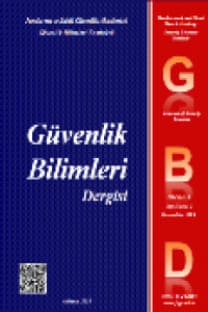ULUSLARARASI GÜVENLİĞİN TARİHSEL GELİŞİMİ VE POST-MODERN GÜVENLİK DÖNEMİ
Güvenlik, Ulusal Güvenlik, Uluslararası Güvenlik, Strateji, Güvenlik Politikaları
HISTORICAL DEVELOPMENT OF INTERNATIONAL SECURITY AND POSTMODERN SECURITY PERIOD
Security, National Security, International Security, Security Politics, Strategy,
___
- Ahval News, (2019). "Turkish Military", https://ahvalnews.com/turkish-military/significance-turkeys-overseas-military-bases (Erişim: 27.09.2019).
- Aslan, A. (2018). " Kızıldeniz'deki askeri üsler ve Türkiye'ye teslim edilen Sevakin Adası", https://www.gzt.com/dunya-politika/kizildenizdeki-askeri-usler-ve-turkiyeye-teslim-edilen-sevakin-adasi-2953315 (Erişim tarihi: 27.09.2019).
- Berzina, I. (2014). Color Revolutions: Democratization, Hidden Influence, or Warfare? 01. Riga. https://www.naa.mil.lv/sites/naa/files/document/1_WP2014 Color revolutions.pdf. (Erişim:27.09.2019).
- Birdişli, F. (2017). Teori ve Pratikte Uluslararası Güvenlik. 3'ncü baskı. Ankara: Seçkin Yayınları.
- Comte, A. (1852). Catechisme Positiviste, http://classiques.uqac. ca/classiques/ Comte_auguste/catechisme_positiviste/catechisme_positiviste.pdf (Erişim: 10,02,2020).
- CI, (2019). Confucius Institutes: A decade of Culture. http://www.bjreview.com.cn/ special/confucius_institutes_a_decade_of_culture.html (Erişim: 25 Ekim 2019).
- Devetak, R. (2005). Theory of International Relation. 3rd edn. Edited by S. and others Burchil. New York: Palgrave Mc Millian.
- Duguit, L. (2005). ‘Egemenlik ve Özgürlük’, in Cemal Bali Akal (ed.) Devlet Kuramı. 2'nci baskı. Ankara: Dost Kitapevi, ss. 379–400.
- Fischer, J. (1994). Risiko Deutschland: Krise und Zukunft der deutschen Politik. Köln: Verlag Kiepenheuer & Witsch.
- Gaucet, Marcel (2005). ‘Anlam Borcu ve Devletin Kökenleri. İlkellerde Din ve Siyaset’, Devlet Kuramı (Ed. C.Bali Akal) Ankara: Dost Kitapevi, ss. 33–67.
- Goldstein, Joshua S., J. C. P. (2014). International Relations. 10'ncu baskı, New Jersey: Pearson.
- Heywood, Andrew (2018). Siyaset. (19'ncu baskı), Ankara: BB101 Yayınları.
- Hurtado, F. A. ve G. E. (2013). Antropoloji ve Güvenlik Çalışmaları. USA: Universidad de Murcia.
- İbn-i Haldun, (2013), Mukaddime, İstanbul: İlgi Kültür Sanat Yayıncılık.
- Katzenstein, P. J. and N. O. (1993). ‘Japan’s National Security: Structures, Norms, and Policies’, International Security, 17(4), The MIT Press.
- Krader, L. (1968). Formation of The State. Nrw Jersey: Prentice Hall.
- Kaplan, Morton A. (2005). System and Process in International Politics. Colchester: ECPR Press.
- Lewellen, T. C. (2011). Siyasal Antropoloji. Ankara: Bileşik Yayınevi.
- Organski,A.F.K (1968), World Politics, (2d ed.) New York: Alfred A. Knopf.
- Pallmeyer, J. N. (1992). Brave New World Order: Must We Pledge Allegiance? Oregon: Orbis Book.
- Pritchard, E. E. E. (1965). Theory of Primitive Religion. London: Oxford University Press. RM (2019). Russkiy Mir Foundation. Available at: https://russkiymir.ru/en/ rucenter/what-is.php (Accessed: 25 October 2019).
- Spellman W. M. (1998). The Emergence of the Modern State. London: Palgrave Publication.
- Şenel, A. (2001). İlkel Topluluktan Uygar Topluma. 6th edn. Ankara: Bilim ve Sanat Yayınları.
- Uçarol, R. (2013). Siyasi Tarih. Ankara: Der Yayınları.
- Walker, C. and J. L. (2017). ‘The Meaning of Sharp Power’, Foreign Affairs, (Nov 16). https://www.foreignaffairs.com/articles/china/2017-11-16/meaning-sharp-power. (Erişim 27.09.2019).
- Walt, S. M. (1985). "Alliance Formation and the Balance of World Power", International Security, Vol. 9, No. 4 (Spring, 1985), pp. 3-43.
- Walt, S. M. (1991). ‘The Renaissance of Security Studies’, International Studies Querterly, 35(2), pp. 211–239.
- Waltz, K. N. (1993). ‘Emerging Structure of International Politics’, International Security, 18(2).
- Waltz, K.N., (1988). “The Origins of War in Neorealist Theory”, The Journal of Interdisciplinary History, Vol. 18, No. 4, (Spring, 1988), pp. 615-628.
- Wendt, Alexander, (1992). “Anarchy is What States Make of it: The Social Construction of Power Politics”, International Organisations, v.46/2. pp.391-425.
- YEE (2019). Yunus Emre Enstitüsü. Available at: https://www.yee.org.tr/ (Erişim: 25 Ekim 2019).
- ISSN: 2147-2912
- Yayın Aralığı: Yılda 2 Sayı
- Başlangıç: 2012
- Yayıncı: JANDARMA VE SAHİL GÜVENLİK AKADEMİSİ
RADİKALLEŞMENİN ÖLÇÜLMESİ: AŞIRICILIK ÖLÇEĞİNİN VE AŞIRICILIK ÖLÇEĞİ İLE İLİŞKİLİ ŞİDDET YANLILIĞI
STRATEJİ, ÖRGÜTLENME VE MOTİVASYONUYLA KENDİNE ÖZGÜ BİR TERÖRİST ÖRGÜT: FETÖ
Arman SERT, Cenker Korhan DEMİR, Engin AVCI
ULUSLARARASI GÜVENLİĞİN TARİHSEL GELİŞİMİ VE POST-MODERN GÜVENLİK DÖNEMİ
ANKLAV, EKSKLAV VE UÇ TOPRAKLAR-GÜVENLİK İLİŞKİSİ
NATO’NUN YENİ OPERASYON ALANI: SİBER UZAY
AKILLI KENTLERDE VERİNİN GİZLİLİĞİ VE GÜVENLİĞİ: İLKELER VE YAKLAŞIMLAR
SU VE SU GÜVENLİĞİ KONUSUNDA İKLİM DEĞİŞİKLİĞİNE UYUM TABANLI STRATEJİLER: DAKKA VE ANKARA ÖRNEĞİ
BİRLEŞİK KRALLIKTA SİBER EKONOMİK SUÇLARA YÖNELİK KOLLUK FAALİYETLERİ SORUNLARININ İNCELENMESİ
Naci AKDEMİR, Bülent SUNGUR, Bürke Uğur BAŞARANEL
RUSYA POLİS YAPILANMASINDA MODERNLEŞME VE KAMUOYU
